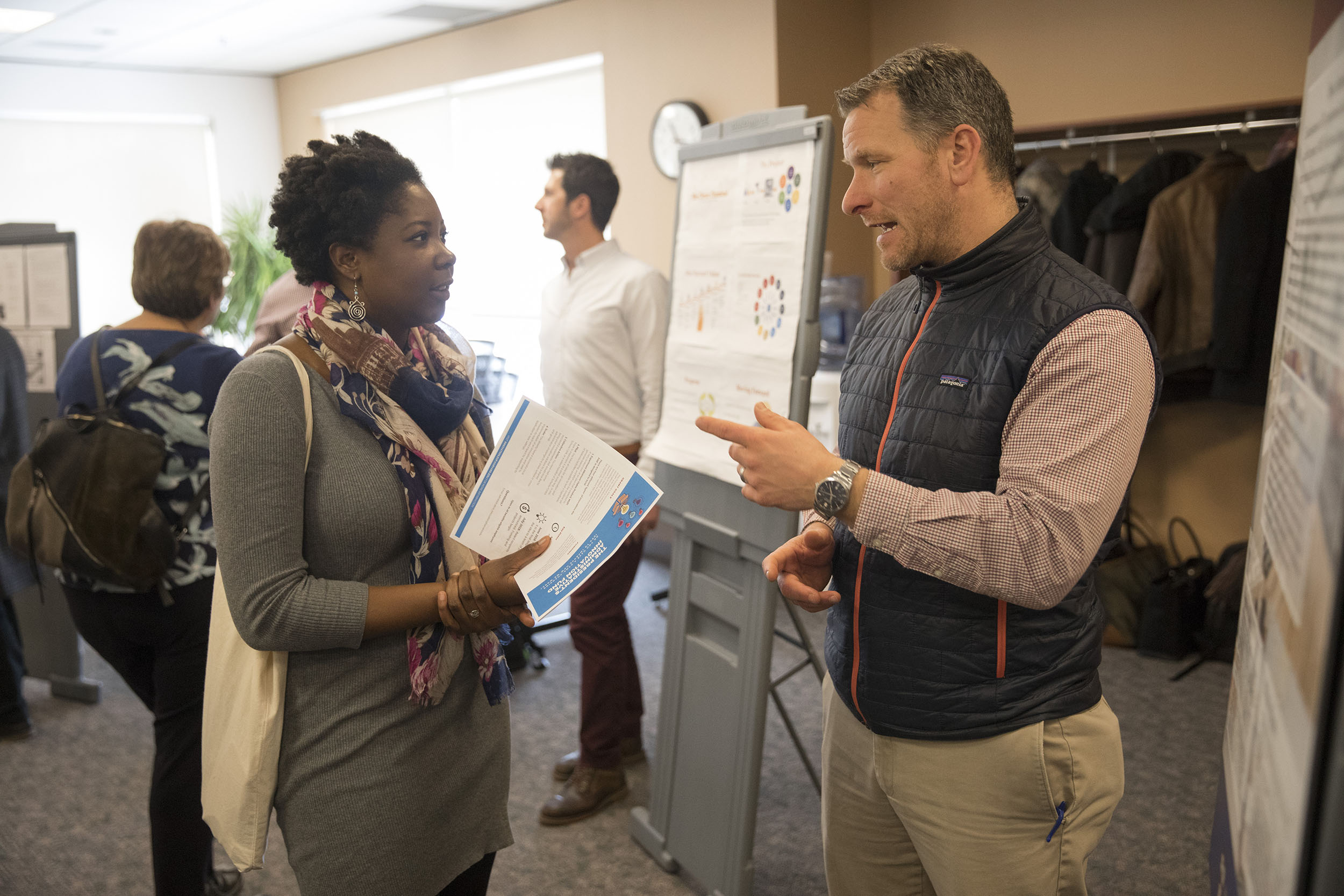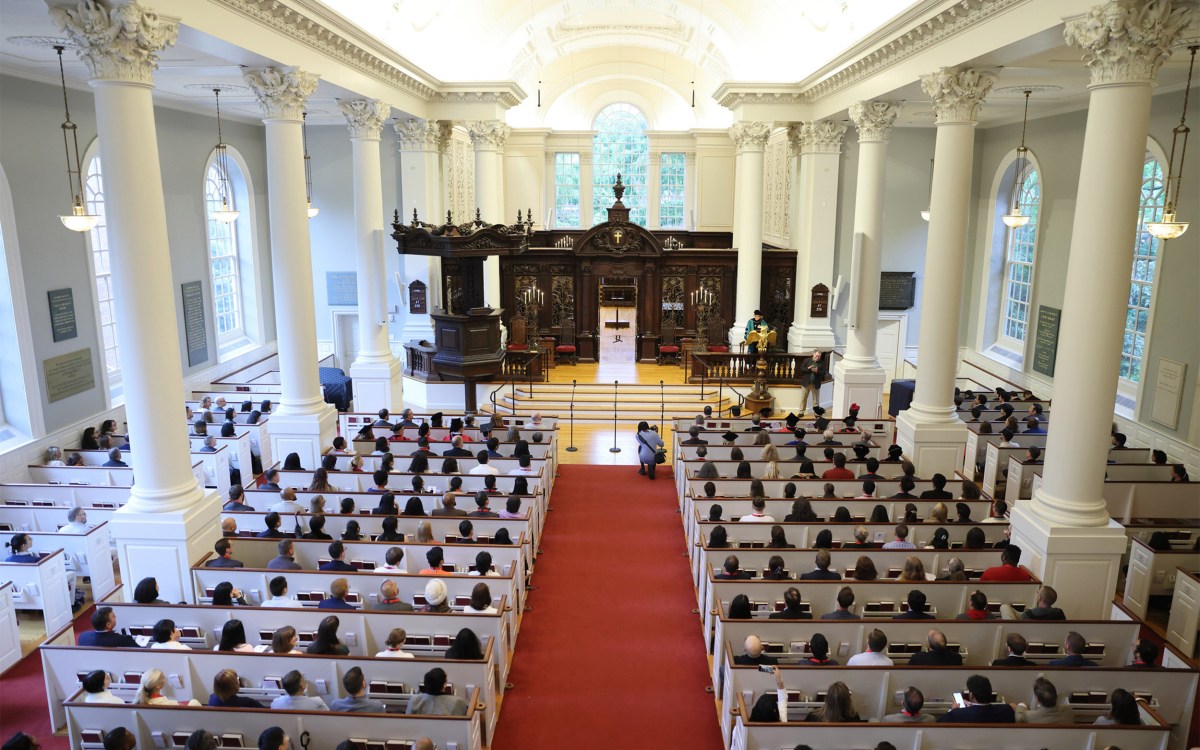
Shelby Acteson and Michelle Hermans of University Disability Services listen to Kyle Shachmut, manager of Digital Accessibility, present his group’s project “Accessible Technology Procurement” during the President’s Administrative Innovation Fund open house.
Kris Snibbe/Harvard Staff Photographer
Investing in creativity
President’s Administrative Innovation Fund seeks applications that embrace problem-solving
The President’s Administrative Innovation Fund kicked off its third application period with an open house on Feb. 27. The fund, which began in 2016 as a One Harvard initiative, invites projects from staff members that offer innovative solutions to persistent administrative challenges across the University.
The fund’s goal is to enhance innovation and collaboration at Harvard and to support teams of administrators who share an interest in strengthening the impact of their work at the University. Over the first two years, there have been more than 100 applications from administrators in Schools and units.
“Harvard has exceptional staff members, and it has been inspiring to see them apply their creativity and talent to support our mission,” said Harvard President Drew Faust. “Helping to foster opportunities for members of our community to find common ground outside of their immediate professional circles is an important part of harnessing the remarkable strengths that exist throughout the University.”
First-year funding recipients included a project to develop an allocation-innovation tool for complex student assignments, new training for financial and faculty support staff, and a means to connect data analysts across the University. This year’s project teams are working on a range of innovations, from flexible work environments to electronic ticketing for Commencement and building a central admissions database.
From the start, the fund supported projects to build the University’s capacity in accessibility. During the 2016‒2017 cycle, a project focused on augmenting the University’s accessibility-testing capabilities. This year, a team of colleagues from Harvard University Information Technology (HUIT), HarvardX, the Faculty of Arts and Sciences, University Disability Services, strategic procurement, and vendor management aimed to create a database centralizing information about the accessibility features of technological products and services purchased by the University. Staff members Kyle Shachmut, Michele Clopper, Bob Doyle, Chris Gambon, Joe Holewa, and Mildene Bradley recognized the need for a place in the procurement process — before products or services were bought — where key questions could be asked to assess the extent to which purchased technology meets accessibility standards.
Shaquilla Harrington, PBHA, listens to Jason Carlson present his group’s project, Flexible Work Environments, during the President’s Administrative Innovation Fund open house.
Kris Snibbe/Harvard Staff Photographer

Having a process in place also encourages technology vendors to work with the University to make sure that their products are accessible, said Shachmut, who has since become manager of digital accessibility in the Office of Institutional Diversity and Equity. The organizers hope that the databases, data collection, and reporting will inform decision-making beyond the life of the grant.
“We saw data-gathering as really important for long-term sustainability,” he said.
Funding applications are evaluated on criteria that include how innovative the project is and its prospect for cross-School and -unit collaboration. Applicants receive written feedback on their project proposals from senior University leaders. During the 2017‒2018 application cycle, 12 groups moved on to the finalist round, where they presented their proposals and answered questions from leadership in a five-minute, lightning-round format. If awarded funding, applicant teams become part of the Innovation Fund cohort, meeting quarterly with other teams to share experiences and develop design thinking, project management, and collaboration skills. Past recipients stay connected to the fund as presenters, ambassadors, and exemplars of the University’s commitment to administrative innovation.
For Kasie Mina, a business process architect in Central Finance and Administration, going through the application process during the first cycle, in which he was not awarded funding, helped him develop and streamline his successful second-cycle team project proposal, the Macro Pack. While macros, which are code scripts that automate tasks within spreadsheets, can greatly vary from person to person, there are often areas of overlap hidden on each person’s computer. Along with colleagues Alec Antell, Ken Knoblock, Jeroen Nefkens, Tom Price, and Stephen St. Cyr from the Office of Treasury Management, as well as Campus Services, Central Finance and Administration, the Office of Financial Strategy and Planning, and the Medical School, Mina worked to establish a group of macros on an external server that University employees could access at any time.
“We can put a file out on [the server] and if it’s a macro set that people are linking to, if we update that one file it’ll update for everyone,” said Mina. “Not only will they get the benefit of updates, but they’ll also see … macros that other folks have created for certain jobs.”
The fund application deadline is April 2, with the first round of judging running through early May. While priority will be given to projects that focus on inclusion and belonging, in alignment with the work of the Harvard Task Force on Inclusion and Belonging, other categories welcoming proposals include administrative innovations that serve the academic administration, service delivery, and talent development.




